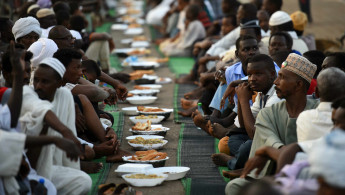Sudanese military accused of 'blocking' fasting protesters access to food, water as negotiations resume
Sudanese protest leaders will on Monday resume negotiations with the country's ruling transitional military council, with opposition organisers calling on the military to resolve "controversial issues" within the next 72 hours.
Among the most controversial issues protest leaders are looking to tackle is that of Islamic Sharia law.
The transitional military council announced last week that Sharia law would remain the guiding legal principle in Sudan, despite many protesters calling for civil law.
The latest in a weeks-long series of stop-start negotiations between the military and civilians comes after leading protest organiser the Sudanese Professionals Association (SPA) on Sunday accused the military of restricting demonstrators' access to food and water.
Thousands of protesters have been gathered at a mass sit-in outside the Army General Command in the capital Khartoum since 6 April, in addition to sit-ins, strikes and protests across the country.
Since the ousting of former President Omar al-Bashir from power last month, civilians and military leaders have been divided over what role, if any, the military should play in the transitional period.
Many protesters are determined to remain on the streets until the military is pressured to cede power to a civilian government.
Forces "connected to the military intelligence" and "remnants of Bashir's regime" assaulted members of committees responsible for distributing food, water and ice to protesters at the Khartoum sit-in, the SPA said in a statement on Sunday evening.
The intelligence services had also prevented the distribution of these "basic needs" to demonstrators around the time of Iftar, the Ramadan fast-breaking meal, the SPA claimed.
|
|
The holy Islamic month of Ramadan, during which able Muslims fast from sunrise to sunset, began last week.
Thousands of demonstrators are withstanding temperatures exceeding 40 degrees celsius without food and water as they continue to call for a civilian government.
Sudan is also facing chronic water and electricity shortages.
Electrical engineers from the National Electricity Corporation (NEC) went on strike on Sunday, calling on the military council to explain the reason for sometimes day-long power cuts.
The engineers are calling for an official explanation in order to ward off "attacks" by angry protesters, Ahmed Mohamadain, an electrical engineer for the Sudan Electricity Distribution Company (SEDC), a part of the NEC, said on Twitter.
Social media users reported on Sunday and Monday that striking electrical workers had been attacked by the police with batons and tear gas.
Attempts to deprive protesters of food and water are "part of a plan, and several attempts, to end the sit-in", the SPA stated.
Calling on citizens from other areas of the capital and its surrounds to join the sit-in with supplies of food and water, the SPA said it would not hesitate to "peacefully escalate" protests if such attempts continued.
The transitional military council denied attempting to break up the sit-in in a statement on Sunday.
But the council has been repeatedly accused by protesters and organisers of trying to disperse the sit-in by force.
In previous weeks, the council has ordered demonstrators to remove barricades surrounding the sit-in.
Protesters reinforced existing barricades and constructed additional roadblocks in response.
But the council also signalled it would have no qualms with dispersing protesters elsewhere.
"What is happening outside the sit-in is another matter that needs to be resolved," read the statement, referring to protesters closing off parts of Khartoum's Nile Street thoroughfare on Monday.
Protesters began to erect roadblocks using rocks, tree trunks and branches, witnesses told AFP, because the military had not allowed them to reach the sit-in outside the Army General Command.
Follow us on Twitter: @The_NewArab





 Follow the Middle East's top stories in English at The New Arab on Google News
Follow the Middle East's top stories in English at The New Arab on Google News
![The UAE is widely suspected of arming the RSF militia [Getty]](/sites/default/files/styles/image_330x185/public/2024-11/GettyImages-472529908.jpg?h=69f2b9d0&itok=Yauw3YTG)
![Netanyahu furiously denounced the ICC [Getty]](/sites/default/files/styles/image_330x185/public/2024-11/GettyImages-2169352575.jpg?h=199d8c1f&itok=-vRiruf5)
![Both Hamas and the Palestinian Authority welcomed the ICC arrest warrants [Getty]](/sites/default/files/styles/image_330x185/public/2024-11/GettyImages-2178351173.jpg?h=199d8c1f&itok=TV858iVg)